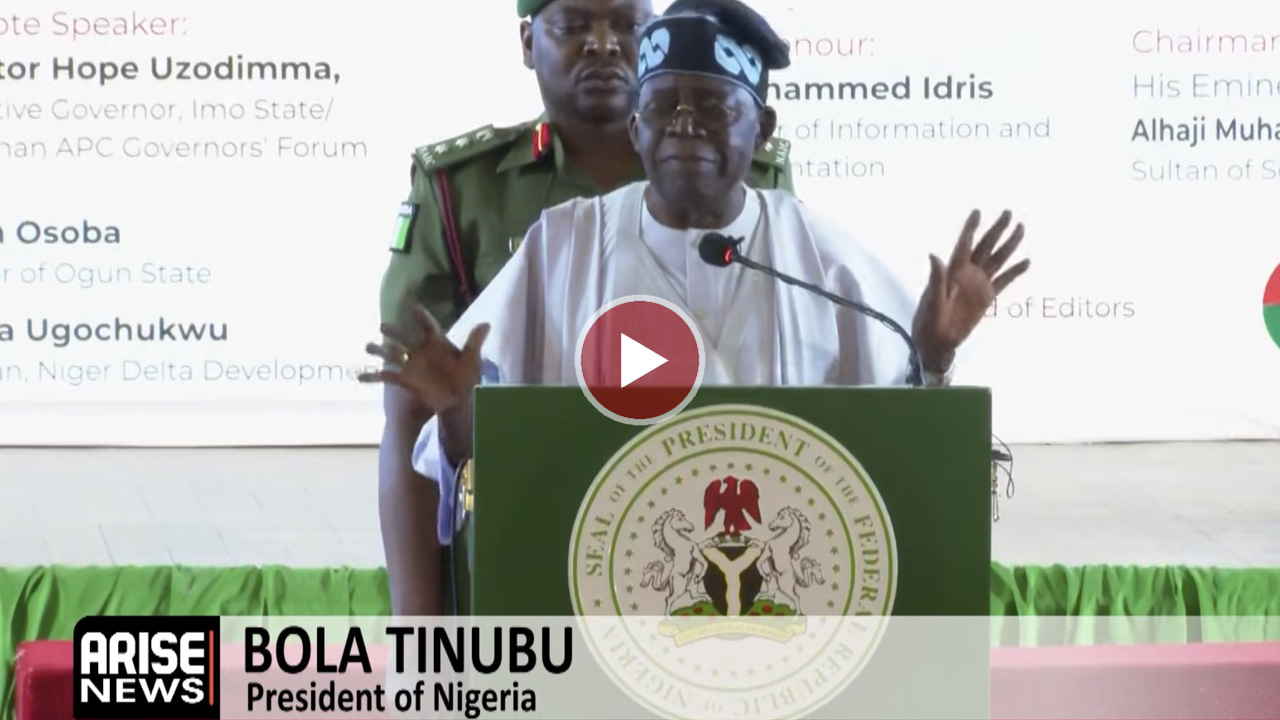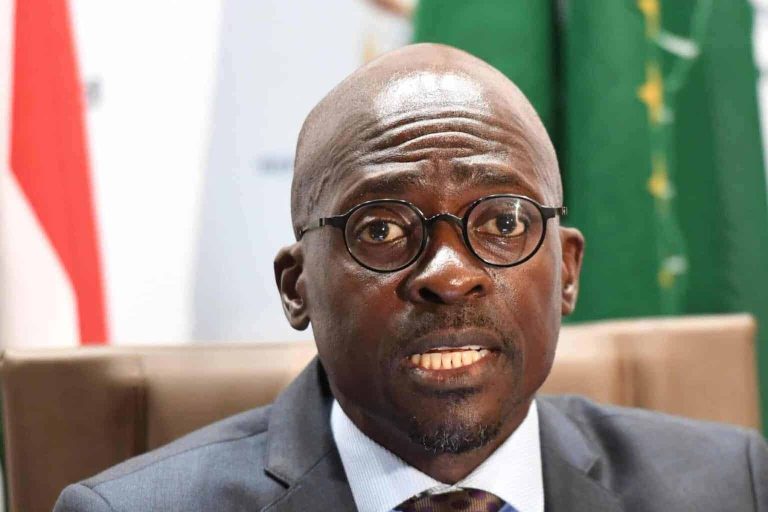

President Bola Ahmed Tinubu on Wednesday urged Nigerian editors to uphold professionalism, fairness, and national interest in their reportage, describing the media as a cornerstone of democracy and national cohesion.
Speaking at the opening of the 2025 All Nigeria Editors Conference (ANEC) in Abuja on Wednesday, President Tinubu emphasised the crucial role of the press in shaping public discourse and sustaining democracy.
In a statement, the President said:“Chairman, Progressive Governors Forum, we hope we have listened to you and thank you for the pigs. All of the Governors here, all members of the Executive Council, particularly the man who dragged me here, Mohamed Idris — he was so passionate and committed, he dragged the Alake with him to the office. He said, ‘Mr. President, you have to attend the Guild of Editors Conference.’
“I’m here. All the former state governors, leaders, members of the diplomatic corps, President of the Nigerian Guild of Editors, Izzy, and others — that was quite interesting. And the esteemed members of the Guild.
“Our royal fathers, thank you for being here. And all those in defence of our democracy and the future of this country — you have always been there, with commitment and valuable suggestions. Thank you, Eminence, the Sultan of Sokoto. The captains of industry, gentlemen of the press, distinguished ladies and gentlemen.”
Reflecting on his administration’s economic reforms, Tinubu recalled the public reaction to key policy decisions, including the removal of fuel subsidy and the floating of the naira.
“If I look back at the time I first assumed office and the way you all dealt with me — over subsidy removal, quote unquote, the floating of our exchange rate, removing the arbitrage, the corruption in society, and the opportunity blocked against a rentier economy — we should celebrate that one today,” he said.
“That the tunnel of darkness and the echoing of the economy is getting better. It is my privilege to welcome you to the State House. This is for free. It’s your house.”
Tinubu commended the Nigerian Guild of Editors for sustaining what he described as “a tradition of reflection and professional engagement,” adding that the chosen theme — Democratic Governance and National Cohesion: The Role of Editors — was both timely and necessary.
“The theme invites us to reflect on the state of our democracy and the way in which public discourse can either strengthen or weaken the bonds that hold our nation together. This conversation is necessary as we continue to build institutions that are transparent, resilient, and trusted by our citizens,” the President stated.
He highlighted the historical role of the Nigerian press in promoting national awakening and defending democracy, praising journalists who endured persecution during the military era.
“Throughout our history, journalism in Nigeria has been more than a profession — it has been an instrument of national awakening. From early newspapers that challenged colonial injustice to the principled voices that kept hope alive during the dark days of military dictatorship.
“The Nigerian press stood at a critical point in our nationhood to defend reason, dignity, and progress. Many journalists endured intimidation, detention, and hardship in defence of the public good. Their sacrifices are part of the foundation upon which our democracy rests today. We honour them not only in memory but by remaining committed to the values they upheld.”
Tinubu urged editors to exercise their influence responsibly in an age of misinformation, saying the editorial role was now more important than ever.
“Freedom secured through struggle is not self-sustaining. It requires constant vigilance and responsible exercise. Democracy is sustained not only by elections and laws, but also by the integrity of public conversation.
“As editors and managers of the national information space, you shape narratives, influence public understanding, and decide what becomes national focus. The weight of that responsibility is extremely significant and must be exercised with wisdom, fairness, and a strong sense of national duty.”
The President cautioned against divisive reporting and sensationalism, noting that constructive criticism strengthens democracy while cynicism undermines it.
“Debate and differences are part of our reality. However, disagreements must never translate into erosion of national cohesion. Criticism, when informed and constructive, is a service to the nation. But cynicism that breeds mistrust and despair can weaken the very foundation of the society we seek to improve. The national interest must always remain paramount.”
On the influence of social media, Tinubu said the speed of falsehood poses a danger to public trust and emphasised the need for editors to uphold truth and balance.
“We live in a time when information travels rapidly and widely. Social media has made every citizen a potential publisher. This has benefits, but it also increases the speed and scale of misinformation. Falsehood can take root before truth has time to speak.
“In such an environment, the editorial function is more important than ever. Verification must be your anchor, balance your principle, and professional judgement your guide.”
He urged journalists to be fair yet firm in holding government accountable.
“Report boldly, but do so truthfully. Criticise government policy, but do so with knowledge and fairness. Your aim must never be to tear down what we are building together, but to help build a better society.”
Reaffirming his administration’s commitment to reform, Tinubu said:
“This administration remains committed to securing our nation, sustaining economic stability, and widening the circle of opportunity for all citizens. The reforms we have undertaken have been challenging, but they are designed to place our economy on a strong and enduring footing.
“We have taken steps to restore macroeconomic balance, encourage investment, and build confidence. The signs of progress are visible in several sectors of the economy. Still, we know there is more work to do, and we remain focused on ensuring that growth translates into real improvement in the daily lives of all Nigerians.”
He further noted that nation-building demands collaboration across all sectors.
“Economic reforms and institutional improvement alone cannot build the Nigeria we seek. Nation-building requires cooperation, trust, and a shared understanding that our future is tied together. Government has its role to play, the private sector has its role, civil society has its role, and the media has a distinct responsibility to help shape a climate of reason and unity.”
Tinubu also responded to requests from the Nigerian Guild of Editors for fiscal and institutional support for the media.
“I have listened to the request of the Chairman of the Guild. While I waited for the full write-up, I noted the corporate tax relief as part of the reform, VAT exemption for media tax credits, affordable loans from BOI and DBN, establishment of development grants for digitisation, repeal of laws that inhibit press freedom.
“I, as your President, endorse these proposals. Media and safety data will be our core.”
He concluded by urging journalists to project a positive image of Nigeria and contribute to building a nation of integrity and hope.
“What should be worrisome to you is the image of the country you project to the outside world. How well your institution is making effort to build a nation of credibility and integrity that is required. We may be poor — poverty is not going to be our destiny. We are going to come out of it.
“Yes, we are challenged by terrorism and banditry. We recognise that. Are we doing something about it? Are we inspiring the armed forces? They put their lives on the line to defend the sovereignty of this country. It is our responsibility.”
President Tinubu wished the editors a successful conference, saying:
“I wish you constructive, thoughtful, and fruitful deliberations. I look forward to the outcome of your discussions. God bless the Republic of Nigeria.”
Boluwatife Enome



